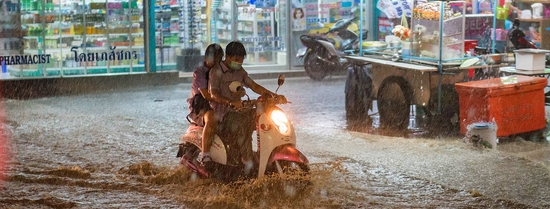‘We believe you can be a good academic, and maintain scientific rigour and perspective, and yet be outspoken.’
This attitude, elucidated by Dr Rodrigo Mena, deputy director of the Humanitarian Studies Centre (HSC) at the International Institute of Social Studies (ISS), seems to be widely held by the team he co-leads with centre director Professor Thea Hillhorst.
The HSC team are, in Mena’s words, highly committed to 'walking the talk' with respect to their contributions to academia and the humanitarian arena at large.
Humanitarianism in practice
This is perhaps nowhere more evident than in their ongoing project, Humanitarian governance: accountability, advocacy, alternatives, funded by the European Research Council. The operative definition of 'humanitarian governance', at least with respect to this project, ‘refers to how the government, national and international humanitarian organizations, civil society actors and communities work together (or not) to address humanitarian needs.’
The ‘or not’ here alludes to the project’s guiding premise that humanitarianism is shaped in practice, unfolding in the vast and complex 'humanitarian arena' in which actors large and small negotiate and determine the material realities of humanitarian action.
Says Professor Hillhorst, ‘There is never a one-size-fits-all, one-actor-determines-all type of situation. There are always different actors involved, and [it] is in their interplay where you see humanitarianism being shaped in practice’.
From a research perspective, this is perhaps an especially valuable insight, as humanitarianism in wider public discourses is often synonymous with the grinding mechanisms of enormous organizations and donors like the UN. Hillhorst further qualifies: ‘You have scholars that argue that humanitarian actors form a kind of empire, they very strongly determine what is going on, or that humanitarian donors have all the muscle, whereas we say no, let's have a more open view.’
This openness extends beyond a generalized assessment of the humanitarian arena and informs the foundational structure of the Humanitarian Governance project and its ancillary activities, as well as its less tangible ethical underpinnings.
Observing humanitarianism in context
Perhaps the most unique tool at the Humanitarian Governance team’s disposal are the humanitarian observatories, organized networks located in crisis-affected communities where representatives of various humanitarian actors and other stakeholders, including affected communities, can gather and discuss diverse topics related to humanitarian governance.
Currently, there are five observatories in operation, located in the Democratic Republic of Congo, Ethiopia, Colombia (as a Latin American and Caribbean observatory), India and the Philippines.
At the time of this article’s publication, team members are travelling to observatory launches in Namibia and Libya, with a further two (Somalia and Poland) set to launch later this year.
'if you want to study food, get into a kitchen’
These observatories further reinforce the fact that crisis-affected community members are already engaged in the work of humanitarian governance. Delu Lusambya, a PhD whose research focuses mainly on his home country of Congo, asserts, ‘[Community members] also have agency. What we [as humanitarians] do sometimes subordinates their will. If they don’t want us, we can’t assist them’. Lusambya moreover advocates for greater ‘downward accountability’ in the humanitarian arena – the need for consent between actors with power differentials, and for a sensitive, relational, context-aware approach to humanitarian crises and the communities afflicted by them. This naturally applies to academia too: higher education, says Dr Mena, has been ‘too disconnected from reality – if you want to study food, get into a kitchen’.
Telling different stories
Perhaps the most novel contribution of the project so far is the notion that context is central to humanitarian governance. ‘Context’ here speaks to the specificity (whether cultural, geographic, economic, etc.) of a given humanitarian crisis and the community in which it takes place.
This finding moreover implies that the current mechanisms of humanitarian action are not flexible enough to truly involve communities in the mapping of their own survival. Rectifying this state of affairs requires the development of the ‘alternatives’ to which the project’s title alludes.
'too often in the humanitarian arena storytelling is carried out by voices accountable only to donors, drowning out advocacy emanating from within crisis-affected communities'
In an academic context, these alternatives take many forms, whether alternate terminologies, platforms for dialogue, ethical frameworks or narratives. This notion is both foundational and transformative: indeed, Dr Mena believes that ‘societies are built on narratives’, and too often in the humanitarian arena storytelling is carried out by voices accountable only to donors, drowning out advocacy emanating from within crisis-affected communities.
The Humanitarian Governance team therefore have a unique positionality as critical, outspoken, praxis-oriented and context-aware academics – and, despite the project’s closing date of 2025, this seems to be only the beginning.

Text by Gabriella Leidam
- More information
The Humanitarian Governance project team currently consists of Professor Thea Hillhorst, Dr Rodrigo Mena, Delu Lusambya, Dr Kaira Zoe Cañete, Gabriela Villacis Izquierdo, Hyeonggeun Ji and Alemayehu B. Hordofa.

